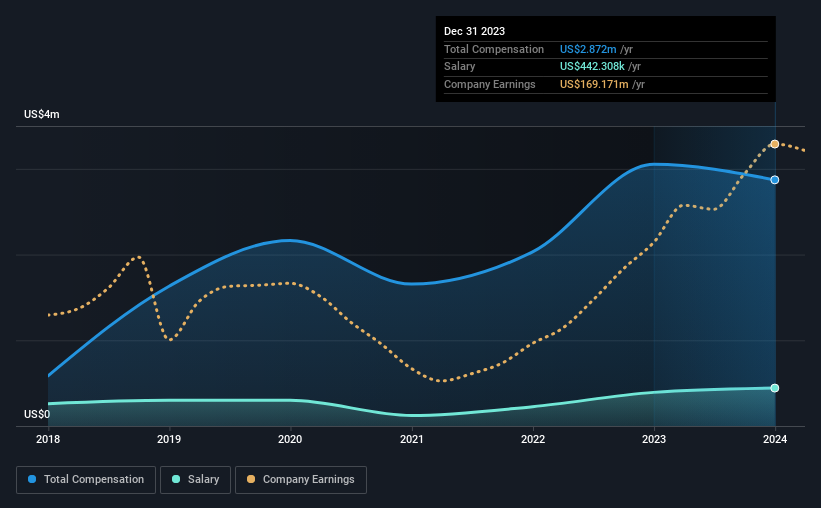We Discuss Whether Cactus, Inc.'s (NYSE:WHD) CEO Is Due For A Pay Rise
Key Insights
Cactus to hold its Annual General Meeting on 14th of May
Salary of US$442.3k is part of CEO Scott Bender's total remuneration
Total compensation is 57% below industry average
Over the past three years, Cactus' EPS grew by 65% and over the past three years, the total shareholder return was 55%
Shareholders will be pleased by the impressive results for Cactus, Inc. (NYSE:WHD) recently and CEO Scott Bender has played a key role. At the upcoming AGM on 14th of May, they would be interested to hear about the company strategy going forward and get a chance to cast their votes on resolutions such as executive remuneration and other company matters. We think the CEO has done a pretty decent job and probably deserves a well-earned pay rise.
View our latest analysis for Cactus
Comparing Cactus, Inc.'s CEO Compensation With The Industry
Our data indicates that Cactus, Inc. has a market capitalization of US$4.1b, and total annual CEO compensation was reported as US$2.9m for the year to December 2023. That's a slight decrease of 5.9% on the prior year. We think total compensation is more important but our data shows that the CEO salary is lower, at US$442k.
For comparison, other companies in the American Energy Services industry with market capitalizations ranging between US$2.0b and US$6.4b had a median total CEO compensation of US$6.7m. In other words, Cactus pays its CEO lower than the industry median. Furthermore, Scott Bender directly owns US$4.0m worth of shares in the company, implying that they are deeply invested in the company's success.
Component | 2023 | 2022 | Proportion (2023) |
Salary | US$442k | US$392k | 15% |
Other | US$2.4m | US$2.7m | 85% |
Total Compensation | US$2.9m | US$3.1m | 100% |
Speaking on an industry level, nearly 16% of total compensation represents salary, while the remainder of 84% is other remuneration. Our data reveals that Cactus allocates salary more or less in line with the wider market. It's important to note that a slant towards non-salary compensation suggests that total pay is tied to the company's performance.
A Look at Cactus, Inc.'s Growth Numbers
Cactus, Inc.'s earnings per share (EPS) grew 65% per year over the last three years. It achieved revenue growth of 48% over the last year.
This demonstrates that the company has been improving recently and is good news for the shareholders. The combination of strong revenue growth with medium-term EPS improvement certainly points to the kind of growth we like to see. Looking ahead, you might want to check this free visual report on analyst forecasts for the company's future earnings..
Has Cactus, Inc. Been A Good Investment?
Most shareholders would probably be pleased with Cactus, Inc. for providing a total return of 55% over three years. As a result, some may believe the CEO should be paid more than is normal for companies of similar size.
To Conclude...
Given the company's decent performance, the CEO remuneration policy might not be shareholders' central point of focus in the AGM. Instead, investors might be more interested in discussions that would help manage their longer-term growth expectations such as company business strategies and future growth potential.
CEO compensation is a crucial aspect to keep your eyes on but investors also need to keep their eyes open for other issues related to business performance. We did our research and spotted 1 warning sign for Cactus that investors should look into moving forward.
Arguably, business quality is much more important than CEO compensation levels. So check out this free list of interesting companies that have HIGH return on equity and low debt.
Have feedback on this article? Concerned about the content? Get in touch with us directly. Alternatively, email editorial-team (at) simplywallst.com.
This article by Simply Wall St is general in nature. We provide commentary based on historical data and analyst forecasts only using an unbiased methodology and our articles are not intended to be financial advice. It does not constitute a recommendation to buy or sell any stock, and does not take account of your objectives, or your financial situation. We aim to bring you long-term focused analysis driven by fundamental data. Note that our analysis may not factor in the latest price-sensitive company announcements or qualitative material. Simply Wall St has no position in any stocks mentioned.

 Yahoo Finance
Yahoo Finance 
